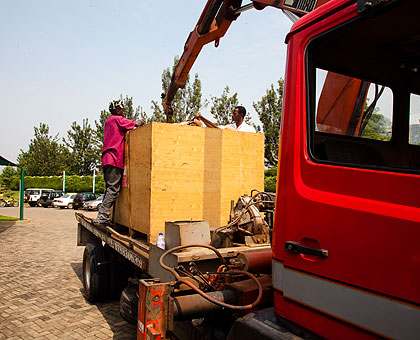Ensuring clearly demarcated borders between countries plays a key role in averting potential conflicts among countries, a top official has said.


Ensuring clearly demarcated borders between countries plays a key role in averting potential conflicts among countries, a top official has said.
Amb. Janvier Kanyamashuri, the director for diplomatic advisory unit at the Ministry of Foreign Affairs and Cooperation, was speaking yesterday at the launch of the African Union Border Management Programme (AUBP) in Kigali.
He said borders that are clearly demarcated are a crucial factor for peace and security because they significantly minimise chances of border disputes.
At the same function, Rwanda received three vehicles, a Global Positioning System (GPS) and scanning equipment (all worth Rwf129.68 million) from the German government.
The equipment will be used in the ongoing demarcation of the borderline between Rwanda and its northern neighbour, Uganda, officials said.
"It’s not about creating new boundaries but rather locating old demarcations, especially in places where they have been destroyed,” Amb. Kanyamashuri said.
Surveyors said the equipment is a boost to the border demarcation exercise. Dominic Rurangwa, a member of the country’s taskforce on border demarcation, told The New Times that the long colonial history of most African nations left a legacy of numerous border disputes. Rwanda and Uganda, which have no border disputes between them, already have an old protocol that guides them.
The colonial protocol has maps and coordinates indicating where pillars separating the countries were initially put. The new GPS equipment is expected to help trace the damaged pillars.
Through AUBP, the African Union is seeking to make international borders more responsive to cross-border cooperation and international trade.
Amb. Aguibou Diarrah, the head AUBP, said the programme was operational in several countries. "We support countries with vehicles, GPS and scanners as well as capacity building on border demarcation,” he said. The German International Cooperation agency (GIZ) provides technical support towards the exercise. Only about a quarter of sub-Saharan borders are clearly delimited and demarcated, according to GIZ.
Ill-defined borders are seen as potential sources of conflict, especially when mineral resources are discovered in the border regions.
The German envoy to Rwanda, Peter Fahrenholtz, said: "Borders were drawn by colonial powers and this created multiple problems. Germany is pleased to contribute towards settling such disputes. Unclear borders, such as in the case of Eritrea and Ethiopia in the past, pose a serious threat to peace and stability.”


